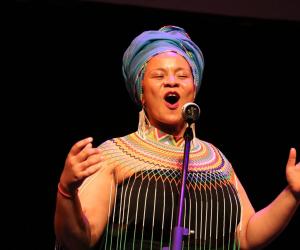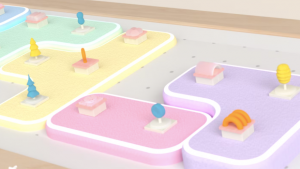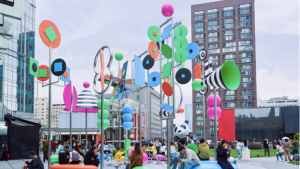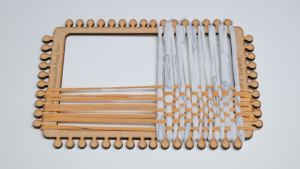As one of only two speakers who have also MC’d the Design Indaba Conference in its 23 year history, Lebo Mashile was right at home on the Artscape Theatre stage. Her talk was a beautiful build-up of the vibrancy she exuded between talks, sharing an energy with the theatre that was almost palpable.
It’s clear from the moment she steps on stage, that this is where she is most comfortable.
Mashile started her talk by painting a picture for the audience of the kind of life that informed much of her passions and career today.
The child of exiled parents, she was born in Pawtucket, Rhode Island in the United States, moved back to South Africa at 18 months, then back to the States as a toddler. One of her first and most vivid memories, she says, was returning to the States, to the strange whiteness of winter’s snow and the strange whiteness of its people. She finally returned to South Africa at age 16 and has been traversing the world since.
“Criss-crossing, jumping identities has been the story of my life,” she adds, but she could always find a reliable refuge in literature. To this day she cites her journals as her lifeline.
While she majored in law and international relations at university, Mashile recognised early on that her own talents were an ability with language and an ability to connect with people. As a member of her audience, there’s no disagreeing with her on that.
While her work is vast and varied across the entertainment space, she says poetry is the chord that runs through everything she does. She recognises that the kind of reach she enjoys in this country would not be likely were it not for the historical legacy of poetry in South Africa.
As the “crown jewel of literature,” she says poetry has been used as a vehicle to “enshrine memory, encapsulate culture, to record people’s DNA and genealogy, as a tool of resistance and expression.”
To figure out how to make poetry live in different spaces is her passion, and as she launches into spoken word pieces on stage, this passion is abundantly clear. Give Mashile a platform, and she moulds words, pulls them apart, and makes them come alive before you, conjuring up feelings you were not expecting to experience at a design festival.
And this extends beyond her poetry. Her performance on stage continued, where we were given an excerpt of her much-anticipated thearte piece with vocalist Ann Masina. When we spoke to Mashile near the end of 2017, she told us this piece had already been six years in the making.
Saartjie vs. Venus tells the story of Saartjie Baartman, the Khoi woman who was displayed across Europe for viewing pleasure during the colonial era. The piece marks an important point in Mashile’s career as it marries the issues her work has been preoccupied with up to this point. Beyond this point in her own career, in a time of #MeToo and #TimesUp, this is the kind of discourse the world needs. It’s bizarre to think that the same issues from two centuries ago are still pertinent now, but here we are.
“Every issue that intersects in Saartjie’s life is an issue that is relevant to us right now. This is why she is the grand ancestor of body politics, of identity politics, black female representation. All roads lead back to her.”
More poetry on the Design Indaba Conference stage:
A love letter to words with Naresh Ramchandani
Chris Gotz: Accidental poetry and story making
Daan Roosegaarde on creating techno poetry
Design Indaba 2018 Conference Talks are presented in partnership with Liberty.








